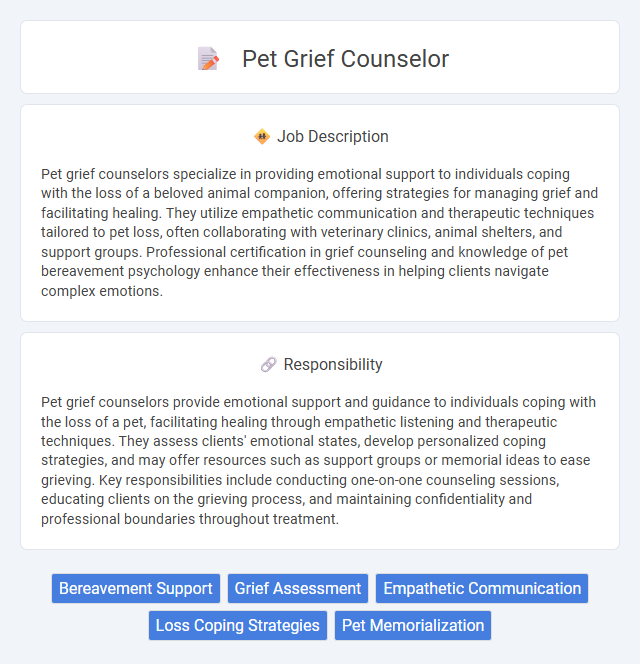
Pet grief counselors specialize in providing emotional support to individuals coping with the loss of a beloved animal companion, offering strategies for managing grief and facilitating healing. They utilize empathetic communication and therapeutic techniques tailored to pet loss, often collaborating with veterinary clinics, animal shelters, and support groups. Professional certification in grief counseling and knowledge of pet bereavement psychology enhance their effectiveness in helping clients navigate complex emotions.
Individuals experiencing intense emotional distress after the loss of a pet may be suitable candidates for a Pet Grief Counselor role, as the job requires empathy and strong listening skills. Those with a passion for animal welfare and psychological support might find this career fulfilling, though it may not be ideal for people who struggle with emotional resilience or prefer less emotionally demanding work. The likelihood of success in this job increases if the person can maintain professional boundaries while providing compassionate guidance during clients' grief.
Qualification
A Pet Grief Counselor must possess a background in psychology, counseling, or animal behavior with certifications in grief counseling or pet loss support. Expertise in empathetic communication, emotional support techniques, and understanding of the human-animal bond is essential to effectively guide clients through pet bereavement. Advanced qualifications often include specialized training in bereavement therapy, certification from recognized pet loss counseling organizations, and experience in veterinary settings or animal rescue environments.
Responsibility
Pet grief counselors provide emotional support and guidance to individuals coping with the loss of a pet, facilitating healing through empathetic listening and therapeutic techniques. They assess clients' emotional states, develop personalized coping strategies, and may offer resources such as support groups or memorial ideas to ease grieving. Key responsibilities include conducting one-on-one counseling sessions, educating clients on the grieving process, and maintaining confidentiality and professional boundaries throughout treatment.
Benefit
Pet grief counselors likely provide emotional support to individuals coping with the loss of a pet, reducing feelings of isolation and sadness. Their expertise in understanding pet-owner bonds may enhance clients' ability to process grief and find healthy ways to remember their beloved animals. This specialized counseling might increase the probability of improved mental well-being and smoother emotional recovery following pet loss.
Challenge
Pet grief counselors likely face the challenge of navigating deep emotional distress while providing compassionate support to clients coping with the loss of a beloved animal. They may encounter difficulties in balancing professional boundaries with empathetic engagement, especially given the strong human-animal bond involved. The role probably demands continuous emotional resilience and specialized communication skills to effectively address diverse grief responses.
Career Advancement
Pet grief counselors specialize in providing emotional support and coping strategies to individuals mourning the loss of a pet, a field with growing demand as pet ownership rates increase globally. Career advancement opportunities include becoming certified grief therapists or pursuing roles in veterinary practices, animal shelters, or private counseling organizations, often requiring additional training in psychology or grief counseling. Professional growth can also involve developing workshops, writing books, or contributing to pet loss support networks, enhancing visibility and expertise in this specialized mental health niche.
Key Terms
Bereavement Support
Pet grief counselors provide specialized bereavement support to individuals coping with the loss of a beloved pet, offering compassionate guidance through the emotional challenges of pet loss. They utilize therapeutic techniques tailored to pet owners, helping clients process grief, manage feelings of sadness, and find healing after animal companionship ends. Expertise in empathetic communication and loss recovery is essential for effectively supporting pet owners during this difficult transition.
Grief Assessment
A Pet Grief Counselor specializes in grief assessment by evaluating the emotional and psychological impact of pet loss on individuals. Using tailored questionnaires and empathetic interviews, they identify grief stages and coping mechanisms to create personalized support plans. This focused assessment helps clients process grief effectively, improving mental well-being during the difficult mourning period.
Empathetic Communication
Pet Grief Counselors specialize in empathetic communication to support individuals coping with the loss of a beloved animal companion. They utilize active listening and compassionate dialogue to validate feelings and facilitate emotional healing. Expertise in grief psychology and animal-human bonds enhances their ability to provide tailored coping strategies and reassurance during difficult times.
Loss Coping Strategies
Pet Grief Counselors specialize in guiding individuals through the emotional turmoil experienced after losing a beloved animal companion by employing evidence-based loss coping strategies such as expressive therapy, cognitive-behavioral techniques, and support group facilitation. These professionals create personalized coping plans that include rituals for remembrance, mindfulness practices, and emotional validation to help process grief stages effectively. Incorporating education on pet loss, customized grief counseling sessions, and resource referrals, Pet Grief Counselors support healthy adaptation to the pain of loss and promote emotional resilience.
Pet Memorialization
Pet grief counselors specialize in supporting clients through the emotional challenges after the loss of a beloved animal companion. They facilitate pet memorialization processes, including creating meaningful rituals, personalized keepsakes, and tribute ceremonies that honor the pet's memory. By guiding clients in expressing their grief and preserving their pet's legacy, counselors help promote healing and emotional closure.
 kuljobs.com
kuljobs.com